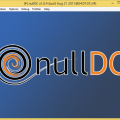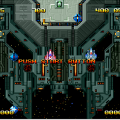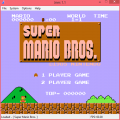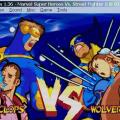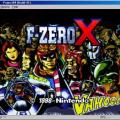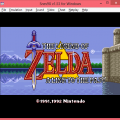- 2 replies
- 1,858 views
- Add Reply
- Multiple Load and Save States supported by Applet and Standalone
- Game Genie Codes supported in Applet Version, press G to see Menu
- Controls can be configured within the GUI
- GUI Improvements for Applet and Standalone versions
- Applet version can load ROMs with extension.zip.php
- When Zapper is plugged in a Cross-Hair appears for firing
- Settings file can be used to store Controls
- Special thanks to Daniel Fisher from www.everyvideogame.com
- 0 replies
- 1,408 views
- Add Reply
- 0 replies
- 1,263 views
- Add Reply
DSEmu 0.0.2a Released!



Our great friend, Two9A has updated his emulator! It has lots of new capabilities and features. Check out the information below. ![]()
Thursday, 17th March 2005
The new versioning policy is in effect. Minor code fixes will cause a letter change, majors a number change. And I've just had a major code change, in the form of a new GPU! Gladius has kindly donated the rest of his GPU after having already given a tile renderer, and now I can safely say I have multiple backgrounds, and they work.
It's not all his code, mind you; I've had to add mosaic, which was quite a task. However, as of now, I have a GPU that is more compatible and provides more features than the one I wrote, so I'm happy. Sprites are in gladius' original code, but I haven't yet ported them; that will come along soon.
»» http://www.dsemu.org [Website]
»» http://dsemu.1emulation.com [Forums]
NESCafe 0.58
NESCafe is an NES emulator written in Java for any platform.
» NESCafe homepage.
Gens32 1.59 Released!
Mame v0.94u2,u3

0.94u3------
Compiler fixes [Atari Ace]
Misc fixes [Nathan Woods]
New Games / Clones supported or promoted from GAME_NOT_WORKING status:
----------------------------------------------------------------------
clones
------
Bubble Bobble (newer set) [Tormod Tjaberg]
Puyo Puyo (World) [Fabrice Arzeno]
0.94u2
------
Changes from Aaron Giles
------------------------
mame.c: updated documentation
cps1.c: fixed QSound routing
cps2.c: fixed QSound routing
itech32.c: fixed Driver's Edge colors (red/blue were swapped)
segaorun.c: many tweaks based on schematics
- connected some outputs via 8255 PPI
- fixed IRQ handling to match schematics
- hooked up watchdog, global mute
- fixed IRQ2 timing
segaxbd: tweaks
- added hack to make GP Rider boot; input bug prevents full playability
- fixed IRQ handling to match schematics
- hooked up watchdog, sound reset, and global mute
- hooked up dummy CPU for running SMGP communications
- reduced interleave on all games except LOF
se***bd: tweaks
- fixed CPU speeds according to schematics
- hooked up global mute
- reduced interleave on all games
machine/segaic16.c: changed divide-by-zero case to return a value
vidhrdw/segaic16.c: several updates
- implemented Y-board sprite priorities (not fully understood, but
seems to work)
- found missing 8th bit in Outrun/X-board sprite pitch
- implemented Outrun/X-board road priorities according to logic dump
from Leopardcats
- hooked up road RAM double buffering that was missing for
Outrun/X-board
- disabled direct scanline mode for Outrun road, which doesn't support
it
Fixed sample playback glitch
Fixed othunder sound clipping
Fixed Batrider sound
Fixed Dream Shopper crash
Added sound balancing assistance display to debug builds
cpuintrf.c cleanup
Removed some unwanted clamping code from sound core
Adjusted Frogger volume
Changes from Brian Troha
Changes from Derrick Renaud
---------------------------
Added proper watchdogs to
Bosconian, Galaga, Pole Position, Xevious
Fixed Wiggie Waggle crash
Fixed some speaker settings
schaser - updated sounds to include missle effect and
fix dot sounds per schematics.
SN76477 emulation - fixed bug where gain was 3x more
then it should be, causing effects to clip for 2/3rds
of the time.
SN76477 emulation - fixes the attack time for one-shot
envelope mode.
Fixed crash in crash, ripcord and robotbwl and added
sample support to them. Samples not currently
recorded.
robotbwl - added discrete simulation for footsteps
crash - added discrete simulation for beeper
Changes from Nathan Woods
-------------------------
src/sndintrf.c:
src/sndintrf.h:
- Added entries for two MESS specific sound cores
src/sound/wavwrite.c:
src/sound/wavwrite.h:
src/sound/discrete.c:
- Changed wavwrite type from 'void *' type to an opaque pointer
'wav_file *'
src/cpu/g65816/g65816op.h:
- This patch fixes a bug whereby the CPU could switch modes without
entering the set of functions for that mode. Specifically, if a mode
change occurs it will break out of the execute function and reenter the
correct function.
Changes from Nicola Salmoria
----------------------------
documented debug mode in TNZS
Fixed some bad gfx in Sky Lancer
Rebalanced Gyruss volume
NMK004 sound simulation
playmark.c updates
- Fixed sprite/tile priorities in World Beach Volley, and fixed SOME
priorities in Excelsior - but not all of them, the high score screen is
still wrong.
- Found bitmap enable bit, fixes girl pictures sticking in Big Twin and
Excelsior, and garbage graphics in Excelsior.
- Added rowscroll support, fixes wbeachvl37b7gre.
- As previously noted, wbeachvl37b16gre could be a genuine bug of the
original - I don't see how it could work otherwise.
Changes from Pierpaolo Prazzoli
-------------------------------
Super Slam update
- Fixed sprites
- Fixed text tilemap colors
- Fixed text tilemap scrolls
- Fixed VSync
Fixed dips in Sky Lancer
playmark.c update
- Fixed dipswitches in Excelsior
- Tweaked bitmap scroll in Excelsior
- Changed bitmap to be drawn after the fg_tilemap (this is correct in Excelsior
and looks better in Big Twin, but looking at the service mode in Excelsior
some "good" bits are trasparent)
- Added Continue dipswtich in Big Twin
Other Changes
-------------
NMK16 dipswitch fixes [brian Troha]
Progress on TX1 / Speed Buggy driver [Phil Bennett]
Still To Do:
Buggy Boy/Speed Buggy
# Arithmetic chip support.
# Correct object drawing and attributes (e.g. zoom factors).
# Road drawing.
# Fix inter-CPU communications.
# Layer mixing.
# Fix controls.
# Discrete sound hardware
TX-1
# All of above
# Missing PROMs
Allow for more than 40 entries in the Analog menu [Christopher Stone]
Fixed dips in Dunk Shot [sonikos]
Fixed some bad gfxlayouts [Atari Ace]
Update to Shrike Avenger, documentating the motor behavior [Peter Sealy]
game is now partially working
Added scroll mouse support [Robin Merrill]
Allowed f1en to show full attract mode [David Haywood]
New Games / Clones supported or promoted from GAME_NOT_WORKING status:
----------------------------------------------------------------------
clones
------
Pit n Run (set 2) [MAN]
Sky Lancer (Orca) [Manuel Assoni]
Star Trek (defender bootleg) [Pierpaolo Prazzoli]
Poker Ladies (Leprechaun ver. 401) [Manuel Assoni]
Pinbo (set 2) [Pierpaolo Prazzoli]
New games marked as GAME_NOT_WORKING
------------------------------------
TX-1 [Phil Bennett]
Buggy Boy [Phil Bennett]

